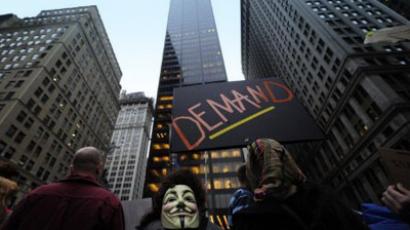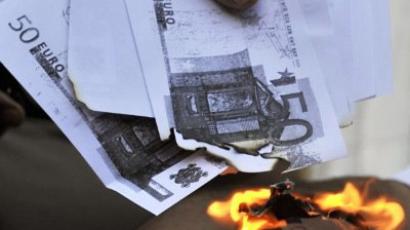Greek cops add severity to austerity
Greece's latest 24-hour national strike turned violent, with police firing tear gas on angry crowds of protesters.
The country all-but-ground to a halt as Greeks made their feelings known about the extra cuts they face so that the country can try and plug the massive 350-billion-euro debt.RT's Sara Firth is in the Greek capital and witnessed tempers flaring.There was anger in Athens, with Syntagma Square once again bearing witness to ugly clashes between riot police and furious protestors.Tear gas was again set off, the riot police moved on to the main square, and one could feel the tensions rising, says Sara.As police moved in to clear the crowds, some shocking scenes took place.At one point, police were seen chasing protestors into the subway station, with many others hit and kicked by those supposed to be keeping control.Scenes like this have raised serious questions about the level of force being used.Manolis Kypraios is a 43-year-old journalist who has reported from many conflict zones. But it was in his own country that he sustained his most serious injury.“The message being sent by the government is one of repression and fear,” he told RT. “I just remember thinking, ‘Is this really happening in Greece?’ I took shelter in an enclosure just off Syntagma and one policeman, who I think was a commander, asked in a very rude way why I was taking pictures. I told him I was a journalist. But he gave an order and I had one of the flashbangs thrown at me – these are some of the last pictures I took.”The place in which Kypraios had taken shelter amplified the sound of the flashbang, causing almost total deafness – an injury which has since cost him his job.“After the attack, and I won’t call it an accident – it was an attack – my life has been like a small hell,” he says.An investigation was launched into the incident, but progress has been slow. In fact Manolis tells us that of countless cases brought against heavy-handed police tactics only two have borne any kind of results.RT witnessed the lack of discrimination when the police lash out – one journalist flung with his camera to the ground.The rise in the level of aggression seen both by the police and more extreme groups of protestors is causing serious concern.But with the government continuing to implement severe austerity measures in a bid to receive further bailout cash, tensions look set to continue to escalate.“I think we are fast approaching breaking point. It is easy to explain it from a psychological point of view,” says lawyer and professor of constitutional law George Katrounglas. “The first reaction of the people was denial, then this great anger, and now the people here are entering a period of depression.”The impact of the financial crisis has been played out blow by blow on Syntagma Square.And there are now fears that the financial crisis will turn into an economic recession that could bring the entire eurozone and not just the Greek people to their knees.
Economic analyst Martin Hennecke also believes that a possible settlement of the Greek crisis will not bring an end to European economic recession.“In a way politicians are about to lose control of that situation. Entirely in Europe we are close to having bankrupts,” he told RT. “Really, they have only got two choices in Europe – either an uncontrolled collapse if they do not do anything much, or give out massive bailout funds. But that would be very inflationary for the euro.”But he is convinced finding a way out of this “economic mess” remains a tricky political question. “If they [Greece] default, it may actually not be the worst thing, and not just Greece, I would think,” he says. ”If Italy defaults it may also not be the worst thing, because then…they can start again debt-free. They don’t have to increase taxes, they can devalue their currencies, have lower taxes [and] become more competitive. Their debt may actually be potentially the best solution.”














